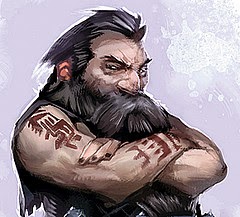Without a doubt my favorite book during my lifetime so far, despite its many faults, has been Robert Pirsig's 'Zen and the Art of Motorcycle Maintenance'. No contest. I found it on a book rack on holiday in Morecambe with my parents in the 1970's, and was mesmerised from the first page.
At one point the protagonist, a version of the author himself, is hiking up a mountain with his son, who in due
course gives up the climb, upset with himself. The author attributes the problem to what he calls 'ego climbing', something the son has picked up from the Boy Scouts - climbing to achieve the goal of reaching the peak. Pirsig instead draws attention to the climb itself, and the enjoyment of the details along the way - the grass, the geology, the exertions of your own body. The things we
should notice. We should be enjoying the mountain sides, and our journeys up them, however arduous, he implies.
But, he goes on to say, it is the summit which
defines the mountain sides, so up we go.
This has been such an important and universally applicable observation throughout my life that I'm inclined to make a plaque of it. There is no doubt that establishing 'goals', in business, sport or hobbies demonstrably leads to better performance (whether or not said goals are hit, and provided that they are well framed so as to avoid unpleasant side-effects). The curious thing for me though is that this is true even though the goals themselves don't really stand scrutiny, and aren't even that important in themselves. It's just that they provide a sort of structure for a life well lived, and for activities which are meaningful. In the moment.
I'm reminded of this now because for the last three months I've been training for an event I've dubbed '50 at 50'. It's my fiftieth year, and as a sort of tenuous link I decided to have a go at getting through fifty rounds of sparring, in this case in historical European martial arts, in a single day. And having decided to do that, it was a short step to use this as a vehicle for fund raising for a couple of charities which resonate with me.
Now I thoroughly enjoy sparring, and I thoroughly enjoy working with historical European martial systems, but trying to get through fifty full contact, full speed rounds is hair-brained at best, and the whole idea not only has no cosmic significance, it has no significance at all. There's certainly no medal at the end of it. A pizza perhaps.
But the reality is that over the last three months I've progressively trained harder than I otherwise would have by an order of magnitude, that I've thoroughly enjoyed and been completely engaged by the weight lifting, the distance running, the drilling, the sparring, the sprinting and the dietary, er, moderation. And I feel great, and that's a reinforcing factor.
Apart from the physical improvement, I've learned a lot that I otherwise probably wouldn't have accessed, especially from other people who've offered up their knowledge and experience. Sport science and biological energy systems, left-ventricular hypertrophy and oxygen transport, VO2, 16th Century German longsword, 19th Century English sabre, performance psychology, the quotations of Ralph Waldo Emerson, to "man up you puff", not to forget my groin guard, presence and flow, and, especially, the power of a well applied
daruma doll.
I'm looking forward to the event now, 27th April, the last Sunday before
Walpurgisnacht, but if it didn't happen I'd have lost nothing and gained a lot.
And all because the mountain is defined by the summit.
.jpg)
.jpg)
.jpg)







